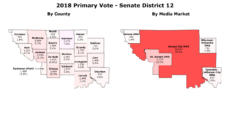With a legislative district encompassing eight counties here in southeast Missouri, I’m privileged to have a front-row seat to all that makes our region great.
As a farmer, agribusiness owner, and former advisory board chairman of the University of Missouri’s Fisher Delta Research Center, I’m also keenly aware of the challenges that can hold us back. At the top of that list: a lack of high-speed internet.

The numbers tell the story: Missouri ranks 41st among the 50 states for broadband connectivity, with roughly 20 percent of the state’s population lacking access to adequate high-speed internet.
In rural areas such as ours, that jarring statistic is closer to two-thirds.
Over the past year, we’ve seen how reliable connectivity has allowed employees to remain productive by working from home, kids to at least try to make up for the many lost hours of in-person learning with virtual school, and families remain connected from afar with their loved ones.
Sadly, we’ve also seen how that absence of broadband service has cost many people their jobs, deprived our children of social connection, and needlessly isolated friends and family. It’s against this backdrop that I’m sponsoring SB 184 and SB 185, the Electrical Corporation Broadband Authorization Act.
This legislation would allow electricity providers like Ameren Missouri, which is expanding its fiber network as part of its Smart Energy Plan, to lease part of its fiber capacity to local internet service providers. These internet providers could then bring high-speed service to an additional 184,000 Missouri small business owners, farmers, and families. The Missouri Public Service Commission would ensure that revenues generated by the utilities from leasing fiber will flow directly back to electric customers to offset other costs and help keep utility rates affordable in our state.
Rural hospitals, many with precarious finances, could greatly expand telemedicine services, connecting patients with providers at the click of a mouse. The economic development benefits are obvious — in today’s digital world, any business without the ability to connect with customers, vendors, and suppliers, anywhere in the world, is at a distinct disadvantage.
Rural broadband expansion is a top priority for Gov. Mike Parson. He described its necessity to a recent Missouri Farm Bureau audience as follows:
“When the pandemic hit, we saw and know we have a lot more to do for rural Missouri for broadband, and we’ve got to step our game up. To be able to compete in the marketplace, to be able to do our farming, to be able to have our kids obtain an education, we’ve got to do a better job. My theory is if we put electricity into everybody’s house, we can put broadband in there. We’ve just got to figure out the solutions to do that.”
Our state’s workforce development officials concur. Early in the pandemic, they issued a report highlighting how the lack of reliable internet access across the state significantly impeded virtual education and job training efforts.
Simply put, if we want future generations to stay in rural Missouri — and those who remain to not only survive but thrive — we need to have a 21st-century infrastructure. Until then, rural Missouri simply won’t reach its full economic and educational potential.

Jason Bean was elected to the Senate in 2020 and represents Butler, Carter, Dunklin, Mississippi, New Madrid, Pemiscot, Shannon, and Stoddard counties. He is a fifth-generation Missourian raised in the Bootheel, and he lives on the same farm where he grew up and learned how to farm.













